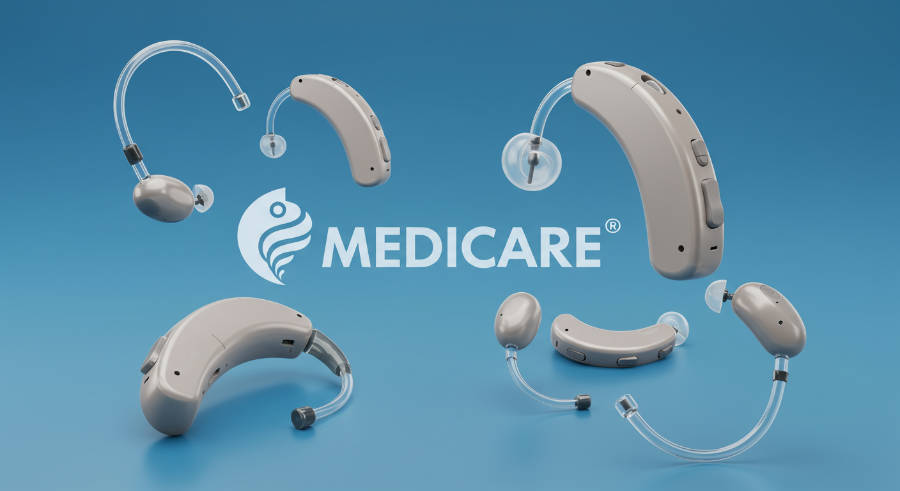No — Original Medicare does not cover hearing aids. And that’s one of the most frustrating gaps in coverage for older adults who depend on their hearing to stay connected with the world around them.
Let’s walk through why this happens, how it impacts your wallet, and what you can actually do to fix it — without breaking the bank.
The Problem: Medicare Leaves a Major Gap in Hearing Coverage
If you’ve been trying to figure out what Medicare covers — and more importantly, what it doesn’t — you’re not alone. One of the top questions we hear is: “Why doesn’t Medicare pay for hearing aids?”
Here’s the truth: Original Medicare (Parts A and B) doesn’t include coverage for hearing aids, fittings, or exams for the purpose of getting them. That means:
-
No help with the cost of hearing aids
-
No coverage for hearing aid fittings
-
No support for follow-up visits related to your device
Even Medigap plans (Medicare Supplement insurance) usually don’t help here.
That’s a big issue. Especially when the average price tag for a pair of hearing aids ranges from $2,000 to $6,000 — and many people need replacements every 3–5 years.
The Agitation: Why This Can Be a Bigger Problem Than It Sounds
Hearing loss isn’t just an inconvenience. It can make it harder to talk to loved ones, follow instructions from your doctor, or even feel safe driving.
Many people put off getting hearing aids because they think the cost is too high. But waiting can actually make your hearing worse — and studies show it may even increase the risk of memory issues or depression.
And here’s the kicker: most folks don’t even realize hearing isn’t covered by their plan until after they’ve signed up.
If you live in Florida, especially areas like Brandon or Riverview, the good news is you do have options.
The Solution: What You Can Do If You Need Hearing Aid Coverage
Here’s how you can get some help with hearing costs — even if Original Medicare doesn’t step in.
1. Consider a Medicare Advantage Plan
Some Medicare Advantage Plans in Florida include benefits for hearing services. That might mean:
-
Free annual hearing exams
-
Discounts on hearing aids through specific providers
-
Allowances or coverage for hearing aid devices
Just keep in mind: not all Advantage plans offer the same hearing benefits. You’ll want to compare Medicare plans in your area or talk to a licensed local agent who can walk you through the fine print.
2. Use Hearing Discount Programs
Some Advantage plans work with programs like TruHearing or Hearing Care Solutions. These networks partner with audiologists and hearing aid companies to provide lower costs.
3. Ask About Local Resources
If you’re in the Tampa Bay area, local agencies or nonprofits may offer financial assistance, especially if you’re on a fixed income. Start by checking in with a trusted Medicare insurance agent in Brandon who’s familiar with local programs.

How Much Do Hearing Aids Really Cost?
Let’s not sugarcoat it — hearing aids are pricey. You could easily spend a few thousand dollars depending on the technology, brand, and where you buy them.
That said, there are ways to cut costs:
-
Shop at warehouse clubs like Costco or Sam’s Club
-
Ask your provider about unbundled pricing (so you don’t overpay for services you don’t need)
-
Consider over-the-counter hearing aids if your hearing loss is mild
If budgeting is your top concern, this article may help: Best Medicare Coverage on a Budget – A Guide for Smart Savings in 2025
What to Do Next: A Quick Checklist
Before you pay out-of-pocket, make sure you:
✅ Know which plan you have
✅ Check if your Medicare Advantage plan includes hearing aid coverage
✅ Compare your options
✅ Talk to a local agent who can give you personalized help
Still not sure where to start? You’re not alone. We’ve helped hundreds of Florida residents make confident decisions about their coverage.
FAQ: Hearing Aids and Medicare in 2025
Does Medicare Part B cover hearing aids?
Nope. Part B only covers hearing exams if your doctor says they’re medically necessary — but not the devices themselves.
Can I switch to a plan that does offer hearing coverage?
Yes! You can explore switching plans during open enrollment or if you qualify for a special enrollment period.
Will my Medigap plan cover hearing aids?
Not usually. Medigap plans help cover costs like deductibles and coinsurance — not extras like hearing aids.
Is hearing aid coverage common in Florida Advantage plans?
It’s more common than you’d think. Many Advantage plans in Tampa and Brandon offer some level of support — but it’s not guaranteed.
Ready to Get Clear Answers?
If you’re struggling with hearing loss or just want to make sure you’re not missing out on coverage, we’re here to help.
👉 Schedule your free Medicare consultation today — no sales pitch, just solid advice.
You can also explore more helpful content in our Medicare blog or learn more about how local Medicare experts in Brandon make a difference.


